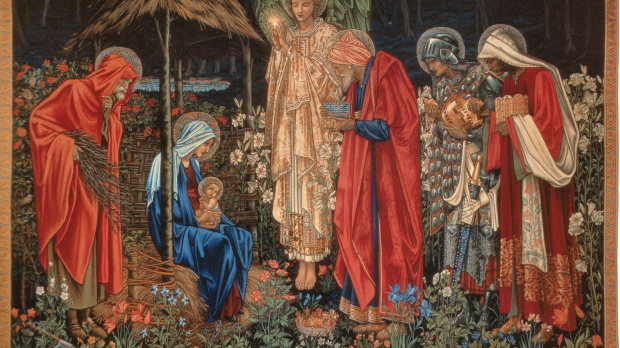The first words spoken in today’s gospel are among the most important we will hear in scripture all year. What sounds like a simple question, in fact, could be one of the most challenging statements any of us will encounter.
“Where is the newborn King of the Jews?”
Put another way: Where do we find Christ?
On this feast of Epiphany—which means, literally, “manifestation”—right off the bat, we are forced to look more deeply at the season we have just celebrated in order to find God made manifest in our world.
We have exchanged gifts. We have swapped cards and eaten rich food and heard endless refrains from Mariah Carey about all she wants for Christmas. We’ve been bombarded by TV specials and tree lightings and last minute shopping. And now trashcans are stuffed with tinsel and wrapping paper and we’re beginning to see trees that have been dragged to the curb.
And we come to the end of this whirlwind only to find the real question, the most important question, now waiting to be answered.
Where is the one who is the reason for the season?
Where is the newborn King of the Jews?
Where do we find Christ?
Matthew’s gospel offers us some clues.
First, we learn, he’s not with the people you would expect. He’s not in a palace, with another king, Herod. He’s not surrounded by servants and footmen, wealth and power. No. Christ is discovered in a simple house, where the magi “saw the child with Mary his mother.” As we heard in the readings from January 1, the Solemnity of Mary, the Mother of God, the first visitors included shepherds—simple men who worked the fields and tended flocks.
It’s clear: This newborn king’s court is different from any other.
Christ is discovered among the humble, the overlooked, the marginalized, the meek.
Look among these, and you will find him.
Secondly, Christ is discovered off the beaten path. He is in a small town that most people wouldn’t think about twice, Bethlehem. This most extraordinary of children is found among the most ordinary of people in the most ordinary of places—so ordinary that you have to “search diligently,” as Herod put it, to find him.
Christ could be anywhere. He could be anyone. He could be everyone.
Look among these, and you will find him.
Thirdly and finally, amid the darkness, Christ is discovered where there is light. A star guides the way to the place where this new king is found. The point is clear: If you want to find him, follow that light. It’s difficult to do that in a world so often overcome by shadows and darkness. Especially now. Especially in a time when people are fearful and uncertain, terrified and terrorized. It was that way in Jesus’s time, as well. But look at where the magi found the son of God: in a forgotten corner of the world, among forgotten people, under a star. Beneath a pinpoint of light.
Where is Christ? Follow the light.
There you will find him, our ultimate source of light and redemption and hope.
This is our Epiphany – our great discovery of God for our own time. He is made manifest to seekers in astonishing places, in astonishing ways.
Mother Teresa once famously said that Christ often comes to us in the “distressing disguise” of the poor.
Seek him as the magi did and we may see other “distressing disguises.”
In our own time, he may be the child hungering for a warm meal or a warm home, or a single mother worried about her future.
He may be found among those who are not near the centers of power: the elderly who have been forgotten, or the sick who have been neglected, or the weary and battered who feel alone and misunderstood.
He is the refugee fleeing persecution. He is the homeless seeking shelter.
He is often found where we don’t expect him.
If the first words spoken in this gospel offer us a profound challenge, the last ones offer profound hope. The magi, we’re told, had to “go home by another way.” An encounter with Christ means we need to change direction.
There is another way.
I can’t think of a better message from the magi—or for the start of a new year.
“Where do we find the newborn King of the Jews?”
Herod’s answer to the magi still speaks to us: “Search diligently.” If we open our eyes, and open our hearts, we will find him. He will be made manifest, perhaps in ways we never imagined. We will share in the greatest epiphany of all.
And then, like the magi, we will find our way home…by another way.
Photo: Wikipedia

